- What Is DSA?
- How Modular Construction Fits into DSA Requirements
- What Does Having DSA Approval Mean?
- What Is DSA Certification?
- What Types of Projects Require DSA Certification?
- The DSA Certification Process in 4 Steps
- 6 Tips for Managing the DSA Certification Process
- Key Questions for School Districts to Ask Their Architect
- How AMS Builds with DSA Certification in Mind
Everything You Need To Know About the DSA Certification Process in California
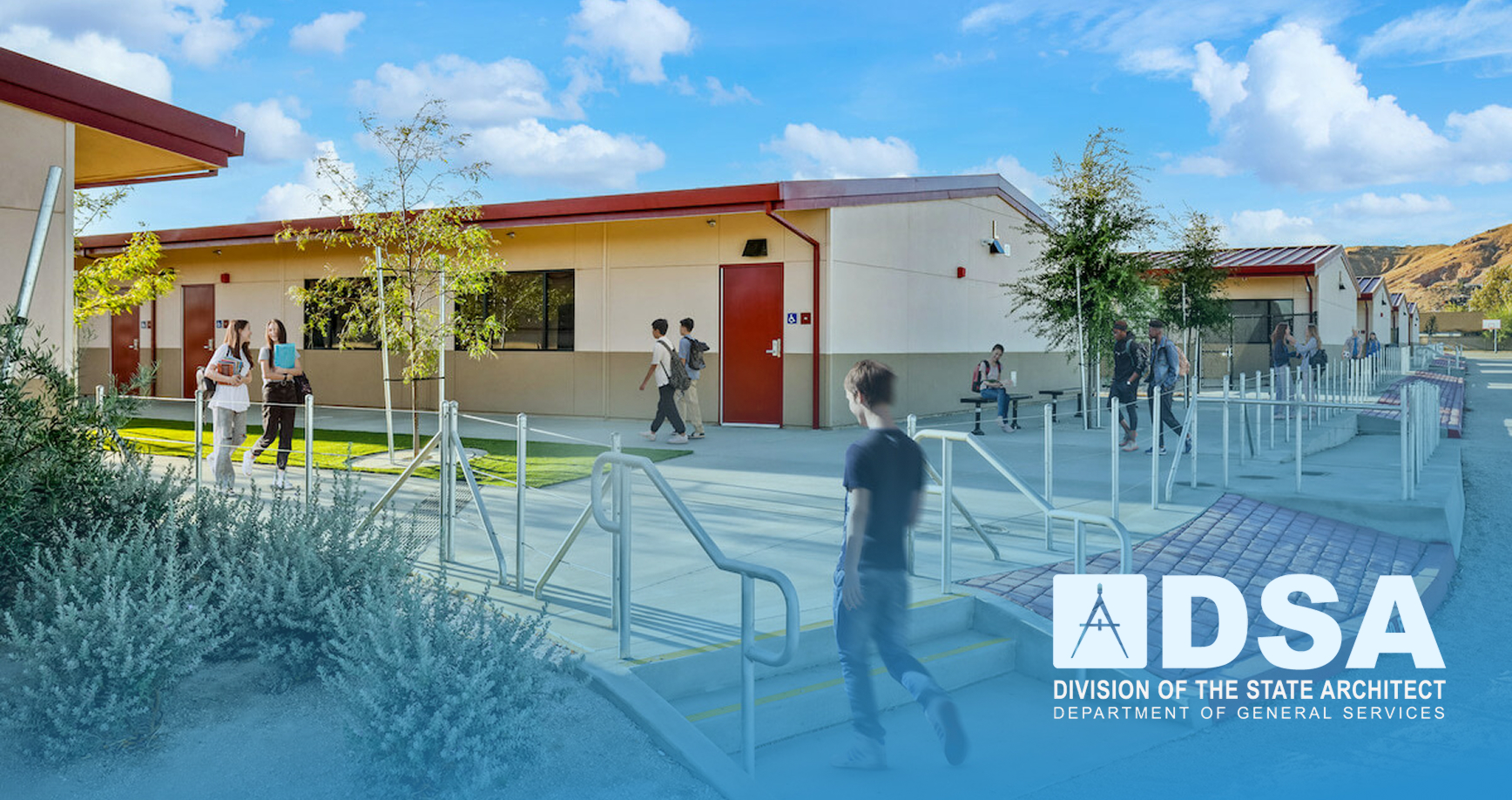
California’s school construction standards are among the most rigorous in the nation, requiring every project to meet the Division of the State Architect (DSA) certification process. These stringent requirements ensure safety, accessibility, and quality, but they can also make the construction process feel overwhelming for schools and districts. Modular construction has emerged as a practical solution, offering schools a faster and more efficient path to compliance while meeting these standards. At AMS, we simplify the DSA process with decades of experience and the largest library of DSA-approved modular designs, helping schools build safe, high-quality facilities on time and within budget.
What Is DSA?

The Division of the State Architect is a California state agency responsible for ensuring that specific types of public construction projects meet rigorous safety, accessibility and sustainability standards. By regulating the design and construction of public schools, community colleges and state buildings, the DSA ensures public safety and compliance with state laws, including the Americans with Disabilities Act (ADA).
For public K-12 schools, community colleges and certain state-funded facilities, DSA approval is generally required. However, private schools and privately funded charter schools are typically exempt from the DSA approval process, though they must still adhere to local building codes and standards.
How Modular Construction Fits into DSA Requirements
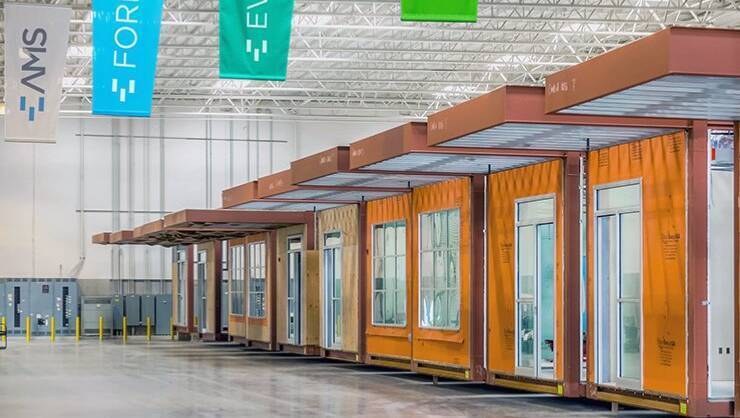
Modular construction offers an efficient path to compliance for California’s school districts, addressing the need for safe, accessible, and high-quality facilities while meeting the DSA’s rigorous standards. By using parallel processes—fabricating modules off-site while preparing the construction site—projects are completed faster and at a lower cost.
One key advantage of modular construction lies in its ability to leverage DSA Pre-Checked (PC) designs—plans that have already been reviewed and approved by the DSA. These options allow for faster project completion and eliminate many back-and-forth revisions during the approval process.
PC vs. Pre-Engineered Projects: What’s the Difference?
It’s important to distinguish DSA PC designs from pre-engineered (PE) projects, as the two approaches often serve different purposes:
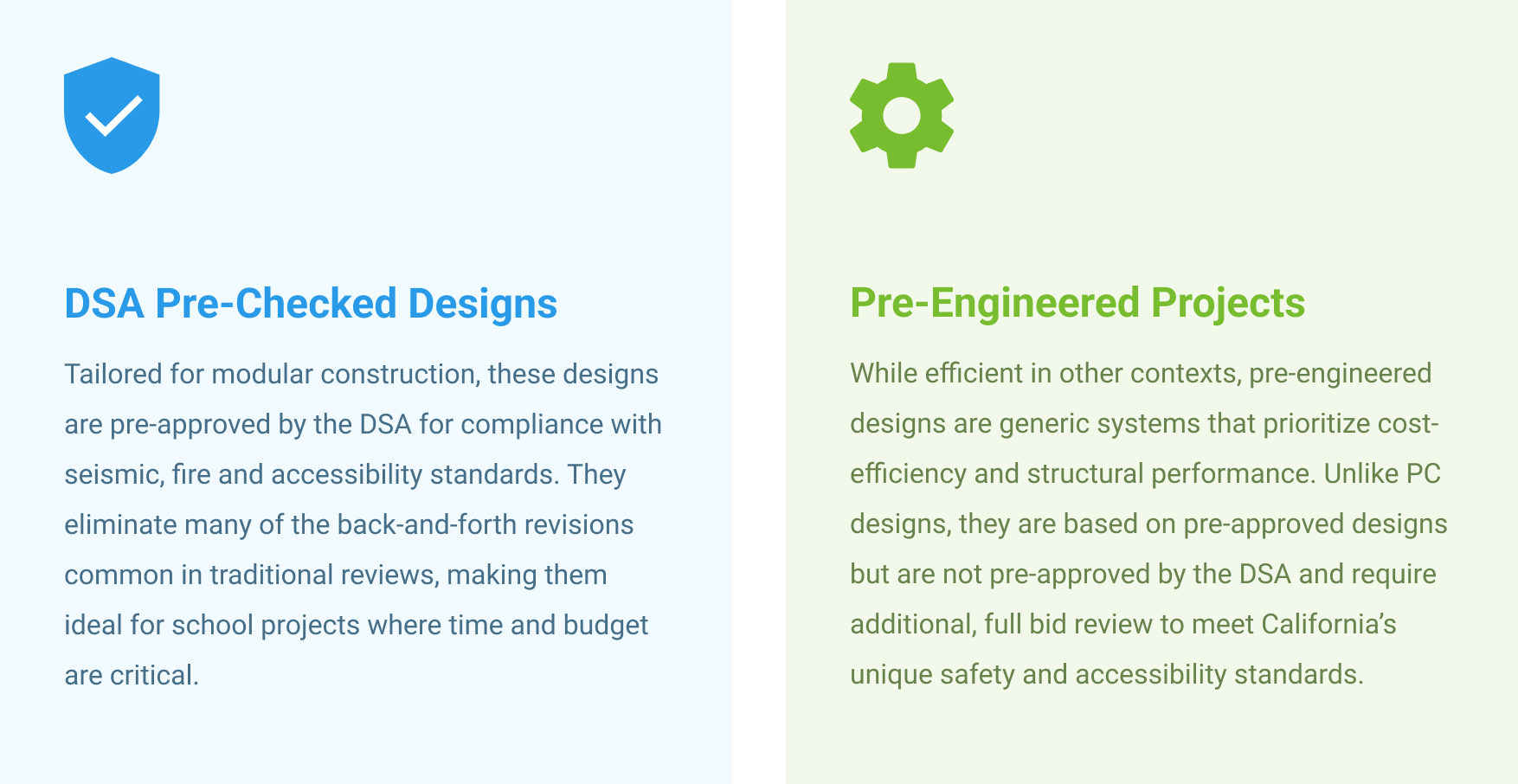
AMS offers a range of modular building solutions tailored to the diverse needs of schools and districts. The chart below highlights the differences between our GEN7, EVOLVE, FORM, and 2GO options, showcasing how DSA PC and PE designs align with your project’s goals for speed, customization and cost efficiency.
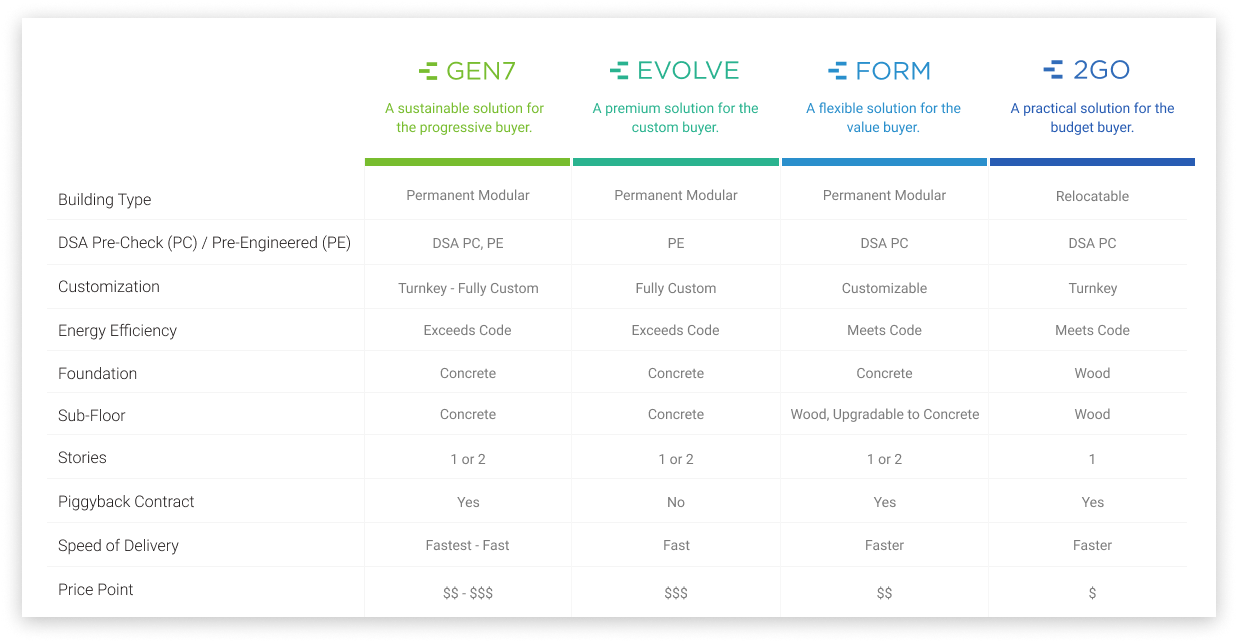
What Does Having DSA Approval Mean?

DSA approval is the crucial first step in California’s school construction process. Before construction begins, the DSA thoroughly reviews and approves the project’s design plans and specifications. This ensures designs align with structural, fire and accessibility codes.
Key Features of DSA Approval
- Validating compliance: Ensures that design plans adhere to state-mandated safety, accessibility and sustainability standards before construction begins.
- Focusing on critical components: Reviews structural safety, fire prevention measures and ADA compliance.
- Laying the foundation for certification: Provides a clear path to final DSA certification by addressing compliance issues early.
For modular projects, DSA-PC designs help streamline this phase by minimizing design revisions.
What Is DSA Certification?

DSA certification is the final confirmation issued by the Division of the State Architect, verifying that a construction project has been completed in full compliance with DSA-approved plans, building codes and safety regulations. For modular buildings, this process includes off-site inspections to verify pre-fabricated units meet compliance before on-site assembly.
It’s important to differentiate between DSA approval and certification:
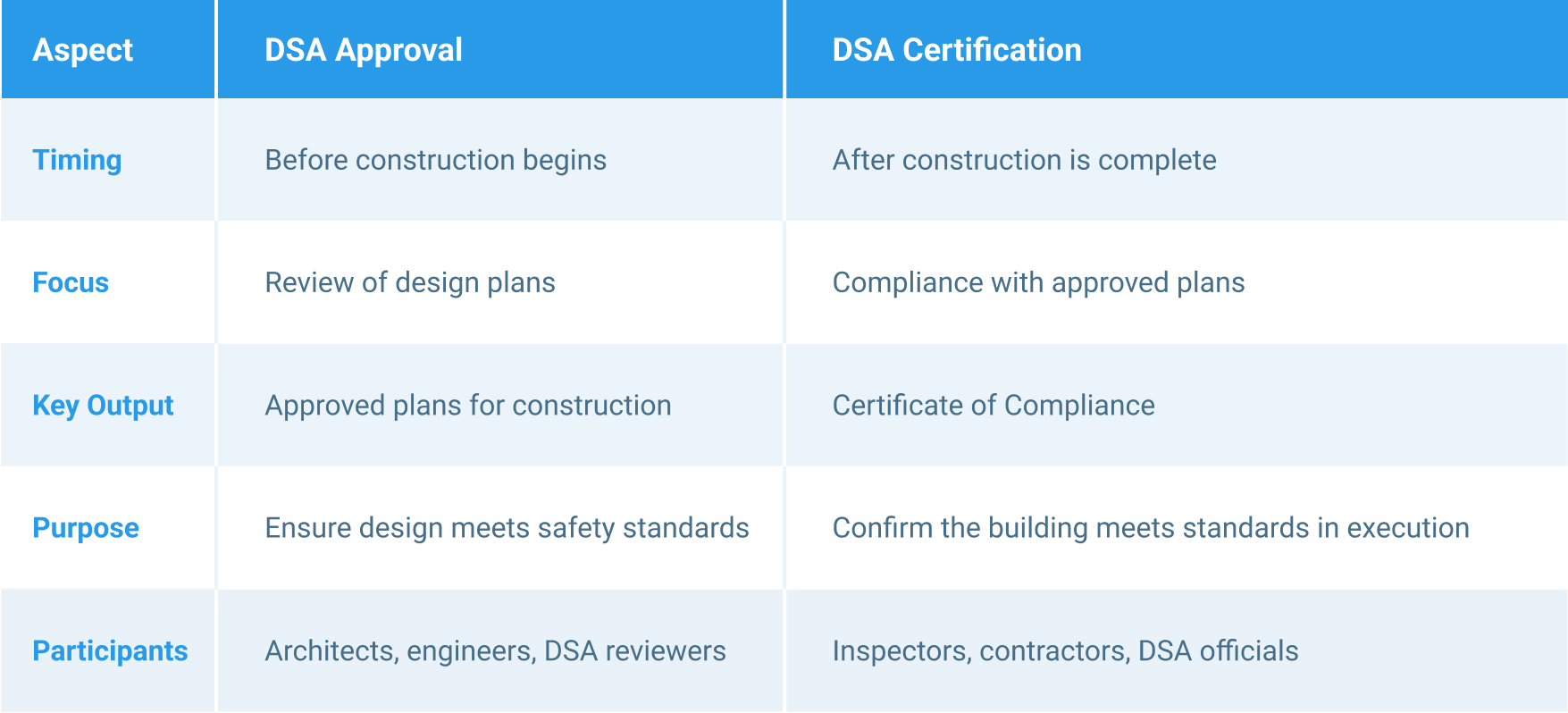
Using DSA Pre-Checked Designs for Faster Certification
DSA-PC designs simplify the certification process by reducing review times. For modular projects, these designs ensure quicker transitions from approval to construction, cutting months off project timelines. Same day approval is typical, although you should always anticipate delays due to unforeseen circumstances and allow for extra time.* AMS offers a range of DSA-PC modular solutions tailored to the needs of educational institutions.
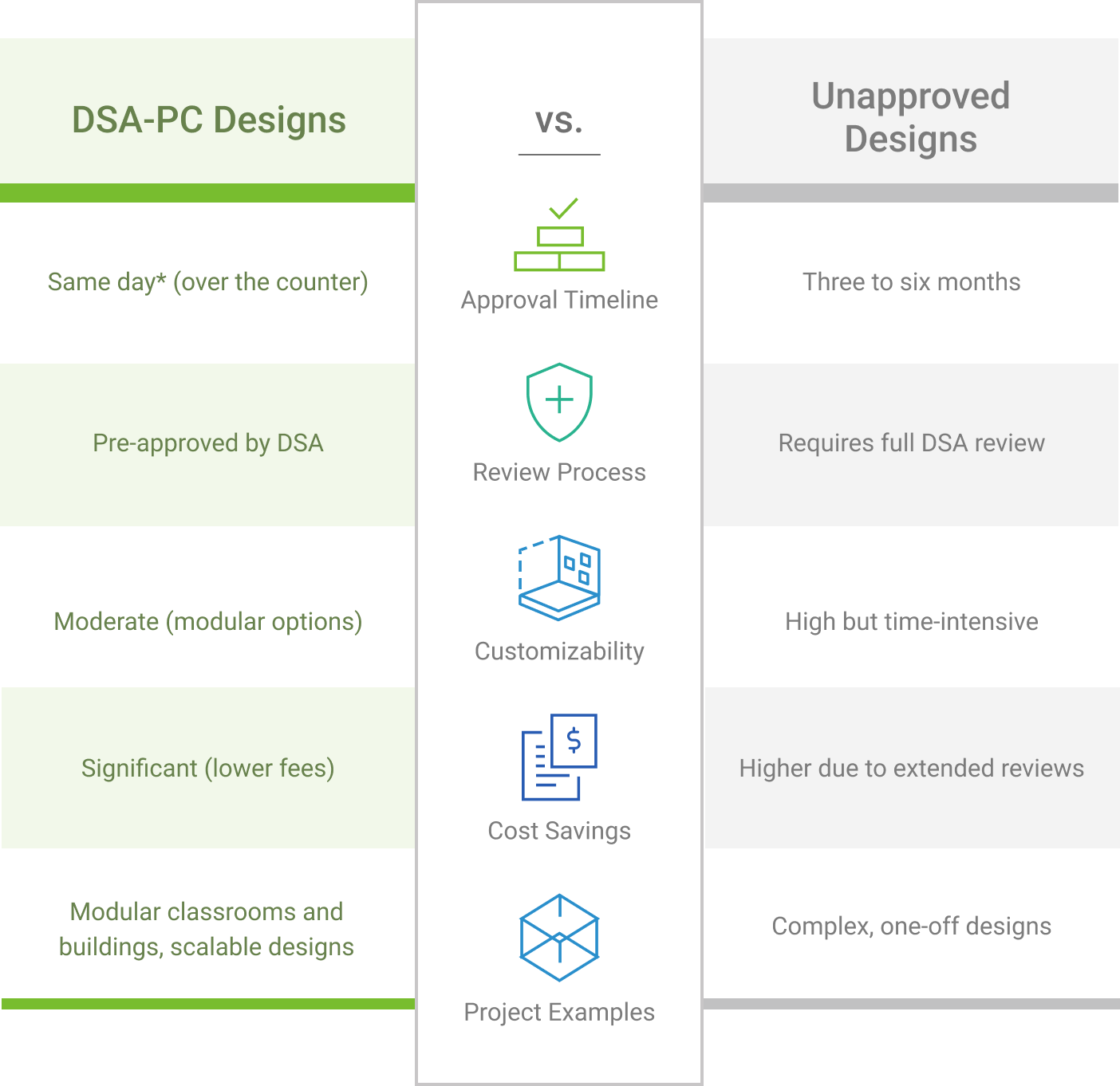
What Types of Projects Require DSA Certification?

DSA certification is required for a variety of public construction projects in California to ensure safety, accessibility and structural integrity in educational environments. Here are a few of the project types that require DSA certification:
Modular buildings
Scalable, efficient structures—including classrooms, STEM labs, administrative offices, and a variety of special use spaces.
Seismic upgrades
Buildings retrofitted to withstand earthquakes and other structural challenges.
New builds
Entire campuses or single buildings like libraries, gyms or classrooms.
Building additions
New classrooms, administrative wings, or multipurpose spaces to existing structures.
Modernizations
Facility updates that improve structural integrity, energy efficiency, or overall usability.
Specialty spaces
Labs, art rooms, auditoriums or athletic facilities that must meet unique DSA standards.
Accessibility improvements
ADA-compliant features like ramps, elevators, or widened pathways that ensure universal access.
Temporary structures
Portable buildings or interim-use spaces that meet safety and compliance standards.
The DSA Certification Process in 4 Steps
The DSA certification process involves several key stages, each designed to guarantee school facilities meet California’s high standards for safety, inclusivity and durability. While the process may vary depending on the project, these are the key steps
Design review:
Architects and engineers submit project plans to the DSA for review. This includes structural, fire and accessibility evaluations. If the design aligns with DSA standards, it moves forward; otherwise, revisions may be required.
Plan approval:
Once the design is approved, the project receives a DSA stamp, allowing construction to begin. DSA pre-checked plans can expedite this phase and shorten the project’s timeline.
Construction phase:
During construction, a certified project inspector verifies that the work complies with approved plans and DSA standards. The DSA 152 Project Inspection Card is used to track and sign off on specific milestones. Reminder: For modular construction, the certification process integrates off-site inspections to confirm units meet compliance before arriving on-site for assembly.
Final certification:
After construction is complete, final documentation is submitted to the DSA to confirm all requirements have been met. The project then receives DSA certification, allowing the facility to be officially used.
If any deficiencies remain unresolved, the DSA issues forms like DSA 301-N or DSA 301-P, outlining missing documentation and parties responsible. These deficiencies are also added to the public Certification Box, which makes details available until all issues are resolved. Once deficiencies are addressed, projects can still achieve certification.
Who is Responsible for Certification?
Achieving DSA certification involves collaboration among multiple parties, as the chart below explains.

6 Tips for Managing the DSA Certification Process

The DSA certification process can be challenging, but with the right approach, it’s possible to avoid delays and keep your project on track. Here are some practical tips for a smoother experience:
- Start early: During the planning phase, engage architects and engineers familiar with DSA modular manufacturer standards. Early collaboration helps identify potential roadblocks before they arise. Keep in mind that while DSA-PC designs can typically be approved the same day, you should always anticipate delays and allow for extra time, just in case.
- Use pre-approved designs: Use DSA-PC designs to expedite approvals. For modular projects, work with certified plant inspectors to ensure off-site compliance and avoid on-site delays.
- Organize documentation: Confirm that all required documents are complete, accurate and submitted on time. Missing paperwork can lead to costly delays.
- Schedule strategically: Pre-schedule your review appointments with DSA to avoid unexpected timing issues. These dates can be booked up quickly, especially for larger projects.
- Communicate clearly: Maintain regular, transparent communication with all stakeholders, including architects, contractors and inspectors. This minimizes missteps and ensures everyone stays aligned.
- Work with experienced partners: Teams with DSA experience can anticipate challenges and guide districts through the process efficiently. When working with modular designs specifically, partnering with an experienced manufacturer familiar with DSA processes can mitigate obstacles and ensure compliance at every step.
Key Questions for School Districts to Ask Their Architect
Progressing through DSA certification starts with clear communication between school districts and their design teams. Asking the right questions upfront can help identify challenges early, keep the project aligned with DSA standards and avoid costly delays. Here are some key questions to consider:
- Are the site-specific designs fully compliant with DSA requirements?
Confirm that your architect is familiar with the latest DSA standards and has incorporated them into the design from the start. Additionally, ask about potential issues related to site integration or access that could affect compliance. - Has the modular manufacturer’s design been approved through DSA Pre-Check?
For modular projects, pre-checked designs can significantly expedite the approval process.- If the design is pre-checked, ask how it will shorten the timeline and simplify reviews.
- If not, inquire about the timeline for obtaining DSA approval for custom designs.
- Are there opportunities to use pre-approved construction plans?
Ask whether pre-approved plans can be integrated into the project to expedite the review process and accelerate the time it takes to complete the project. - What is the timeline for the DSA review process?
Get a clear understanding of the estimated timeline for design reviews, plan approvals and final certification. - How will communication between the design team, modular manufacturer and DSA-certified inspectors be handled?
Coordination among these stakeholders is critical for meeting DSA standards. Confirm your team has a clear communication plan, including regular updates, to ensure alignment at each stage of the project. - What contingencies are in place for delays?
Discuss plans for handling potential delays, such as changes requested during the review process or adjustments needed during construction. - How will documentation be managed and submitted? Confirm that your design team has a system for organizing and submitting all required DSA documentation on schedule.
How AMS Builds with DSA Certification in Mind

With over 40 years of experience, hundreds of DSA-certified projects delivered and the largest library of pre-approved designs in California, AMS helps schools streamline approvals and cut months off project timelines.
Our GEN7, FORM and AMS 2GO solutions are designed with efficiency in mind. Whether you’re looking for customizable permanent modular buildings or practical relocatable solutions, AMS has a pre-approved option to fit your needs.
Simplify Your Path to DSA Certification
Navigating the DSA certification process doesn’t have to be overwhelming. With the right knowledge and an experienced partner like AMS, school districts can confidently achieve compliance and deliver safe, modern learning environments for students and educators.
Ready to simplify your next school construction project? Let’s get started.
Streamline your DSA-certified project. Request a Quote.